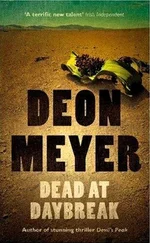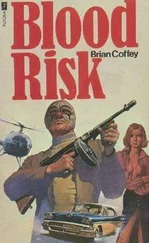Deon Meyer - Blood Safari
Здесь есть возможность читать онлайн «Deon Meyer - Blood Safari» весь текст электронной книги совершенно бесплатно (целиком полную версию без сокращений). В некоторых случаях можно слушать аудио, скачать через торрент в формате fb2 и присутствует краткое содержание. Жанр: Старинная литература, на английском языке. Описание произведения, (предисловие) а так же отзывы посетителей доступны на портале библиотеки ЛибКат.
- Название:Blood Safari
- Автор:
- Жанр:
- Год:неизвестен
- ISBN:нет данных
- Рейтинг книги:4 / 5. Голосов: 1
-
Избранное:Добавить в избранное
- Отзывы:
-
Ваша оценка:
- 80
- 1
- 2
- 3
- 4
- 5
Blood Safari: краткое содержание, описание и аннотация
Предлагаем к чтению аннотацию, описание, краткое содержание или предисловие (зависит от того, что написал сам автор книги «Blood Safari»). Если вы не нашли необходимую информацию о книге — напишите в комментариях, мы постараемся отыскать её.
In Blood Safari
A complicated man with a dishonorable past, Lemmer just wants to do his job and avoid getting personally involved. But as he and Emma search for answers from the rural police, they encounter racial and political tensions, greed, corruption, and violence unlike anything they have ever known.
Blood Safari — читать онлайн бесплатно полную книгу (весь текст) целиком
Ниже представлен текст книги, разбитый по страницам. Система сохранения места последней прочитанной страницы, позволяет с удобством читать онлайн бесплатно книгу «Blood Safari», без необходимости каждый раз заново искать на чём Вы остановились. Поставьте закладку, и сможете в любой момент перейти на страницу, на которой закончили чтение.
Интервал:
Закладка:
‘I know,’ he said, and put out his hand. ‘We are like family.’
As I walked out into the oppressive heat of Maputo, capital of Mozambique, at noon, my cell phone beeped above the hiss of the Indian Ocean. I took it out of my pocket and beckoned a taxi. I checked the message.
Three words only: EMMA IS AWAKE.
49
I must confess that I had expectations about the moment I would walk into Emma’s hospital room.
Not unreasonable expectations, such as Emma opening her arms and embracing me, whispering her gratitude and love in my ear. More along the lines of me sitting on the bed and she taking my hand and saying, ‘Thank you, Lemmer.’ That would have been good enough for me, a start, and a prelude to future possibilities.
But Jack Phatudi deprived me of that.
On Friday, 4 January he sent Black and White, the pair who had followed Emma and me a lifetime ago, to arrest me. The white one’s swelling around the nose and eyes was not totally gone yet. They arrested me with great ceremony at the Kruger Mpumalanga International Airport for ‘murder, attempted murder and defeating the ends of justice’. They allowed me to make one telephone call before locking me in the unbearable heat of the Nelspruit police cells, among a selection of colourful and antagonistic men.
B. J. Fikter came round on Saturday afternoon for what he called ‘cell visitation’. After getting in a few wisecracks about my dilemma, he told me that Emma was being flown to Cape Town on Saturday on a SouthMed Health Care plane. Also that Jeanette said not to worry, she was working on ‘my circumstances’.
By Monday morning there were threats about an additional charge of assaulting a fellow detainee, but I knew they would have difficulty finding credible witnesses. Then Black and White came to fetch me, cuffed my hands and feet, and took me to the magistrates’ court for a bail hearing. They were unnecessarily rough when they shoved me into the back of their Astra.
The holding cells were below the courtroom, in the basement. A young white lawyer with a fat gold ring came to introduce himself as Naas du Plessis. He would be representing me at the request of Jeanette Louw. ‘I will do what I can, but you have a former conviction,’ he said gloomily.
I was the last one to be called, but the two uniforms didn’t take me to a courtroom. They pushed me, shuffling to accommodate the chains and with my hands cuffed behind my back, into a tiny office where Jack Phatudi waited. They shut the door before leaving.
There were a couple of chairs, a table and a steel filing cabinet. I sat down. Silently, Phatudi directed a scowl of hatred at me. Then he punched a deep dent into the filing cabinet. The windows rattled. He came and stood in front of me holding his sore knuckles. His face was only centimetres from mine. For the first time I saw him sweat. The drops trickled down his dark skin, down the tree trunk of a neck into the snow-white collar of his shirt. I could tell by the look in his eyes that he would love to repeat the blow, this time against my head.
‘You …’ he said, but could not go on. He seemed to choke on the words massing behind his tongue. He turned around and kicked the cabinet. Another dent. He came back and grabbed my face with his right hand, fingers over my jaw and cheeks, and he squeezed with frightening force while he stared into my eyes. Then he shoved me backwards, making the chair topple over and my head hit the floor hard.
He made a sound of frustration and rage and said, ‘Let me tell you just one thing. Just one thing.’ He plucked me upright by my clothes and held me in front of him and said, ‘They couldn’t buy me.’ We stood like that, Jack Phatudi and I, and I knew Wernich and his people had made Phatudi an offer which he had refused. And I knew nothing I could say would make any difference.
So I just asked, ‘What do you mean, Jack?’
He let me go, so that I lost my balance and staggered backwards against the wall.
He turned his back on me. ‘They came with money. They said I should drop all charges. Against the one you shot. Against Cobie de Villiers. I refused. They said my people would win their land claim, and they would give money. How much did I want? I said no. So they just went over my head. They bought someone else up the chain of command, I don’t know who. But let me tell you now, I won’t leave it here. I will get you. And de Villiers and Kappies. I’ll get you.’
He turned on his heel and stalked past me without looking at me again. He opened the door and went out, barking some order down the passage in sePedi. The two uniforms came and unlocked the shackles and told me to go; the case against me had been withdrawn.
Emma had a room with a view of Table Mountain. When I arrived the door was open and the room was filled with people gathering around her, Jacobus le Roux, Carel the Rich and some of his children, Stoffel the Advocate, others I did not know. Peace-loving, attractive, successful people. The space was filled with friendship and joy. I stopped in my tracks before they saw me and stole one look at Emma in profile. Her face was thinner, but the lines were so unmistakably beautiful when she smiled, and I turned away and scribbled a note that I left with the flowers at the nurses’ station.
I had to fetch my Isuzu from Hermanus. And then go to Stodels for the herb seedlings.
She phoned me the following day.
‘Thank you for the flowers,’ she said.
‘It’s a pleasure.’
‘You should have come in, Lemmer.’
‘There were so many people.’
‘How can I ever thank you?’
‘I was just doing my job.’
‘Ai, Lemmer, you’re back in your shell again. Where are you?’
‘In Loxton.’
‘What’s the weather like?’
‘Hot.’
‘The wind is blowing here in Cape Town.’
‘I’m glad you’re better, Emma.’
‘I have you to thank for that.’
‘No, you don’t.’
‘I’ll come and visit you. When I’m well again.’
‘You’re welcome.’
‘Thanks, Lemmer. For everything.’
‘It’s a pleasure.’
Then we said goodbye, awkwardly, and I knew that the odds were ten to one that I would never see her again.
It was raining when I read about the deaths of Quintus Wernich and Christo Loock.
It was 14 February and I was sitting at my table reading the paper with thunder rumbling outside above the drum of fat raindrops on the corrugated-iron roof. The front-page article in Die Burger told the story of the suspected carjacking at Stellenbosch and a renewed outcry against the atrocious levels of crime.
I read it twice and then sat staring out of the kitchen window at the bright pools forming in my herb garden and thought about the man with the scarred cheek. Raul Armando de Sousa.
I saw him in 1997, just once, during government talks in Maputo. He called all the bodyguards together in a conference hall to discuss the procedures for the banquet on the final evening. By his eyes I recognised him as a brother-in-violence, but there was more to his dusk-coloured façade – a burden, an invisible weight he carried on his shoulders.
I asked about him circumspectly. They told me that he had been the man who guarded Samora Machel. He had been in the Tupolev 134A when it flew into the side of the Lebombo mountains. He was one of the ten they took out of the wreckage alive. I understood then. I wondered what it must feel like to wait your whole life to be defined, only to find when the crucial moment arrived that there was nothing you could do. Was it not preferable to remain invisible and incomplete?
It was of him that I had thought when Jacobus le Roux told me his story under a tree on Heuningklip. By then I knew how Raul Armando de Sousa must feel. And that sometimes there is a way out.
Читать дальшеИнтервал:
Закладка:
Похожие книги на «Blood Safari»
Представляем Вашему вниманию похожие книги на «Blood Safari» списком для выбора. Мы отобрали схожую по названию и смыслу литературу в надежде предоставить читателям больше вариантов отыскать новые, интересные, ещё непрочитанные произведения.
Обсуждение, отзывы о книге «Blood Safari» и просто собственные мнения читателей. Оставьте ваши комментарии, напишите, что Вы думаете о произведении, его смысле или главных героях. Укажите что конкретно понравилось, а что нет, и почему Вы так считаете.












